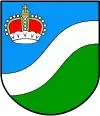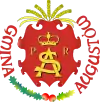Augustów
Augustów (Au-goo-stoof [au̯ˈɡustuf] (![]() listen); Lithuanian: Augustavas, German: Metenburg, formerly known in English as Augustovo[3] or Augustowo)[4] is a city in north-eastern Poland with 30,802 inhabitants (2011). It lies on the Netta River and the Augustów Canal. It is situated in the Podlaskie Voivodeship (since 1999), having previously been in Suwałki Voivodeship (1975–1998). It is the seat of Augustów County and of Gmina Augustów.
listen); Lithuanian: Augustavas, German: Metenburg, formerly known in English as Augustovo[3] or Augustowo)[4] is a city in north-eastern Poland with 30,802 inhabitants (2011). It lies on the Netta River and the Augustów Canal. It is situated in the Podlaskie Voivodeship (since 1999), having previously been in Suwałki Voivodeship (1975–1998). It is the seat of Augustów County and of Gmina Augustów.
Augustów | |
|---|---|
 Top left: Augustów Basilica of Jesus in Skorupki; Top right: Former Water Management Authority's office (Budynek Zarzadu Wodnego); Middle left: An ancient house in Augustów Market Square; Middle right: Netta Nature Park and Augstow Canal; Bottom: Icy season in Studzieniczne Lake | |
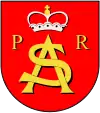 Coat of arms | |
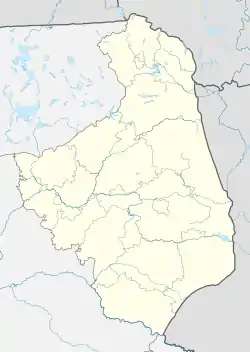 Augustów  Augustów | |
| Coordinates: 53°50′37″N 22°58′39″E | |
| Country | Poland |
| Voivodeship | Podlaskie |
| County | Augustów County |
| Gmina | Augustów (urban gmina) |
| Established | 1546 |
| Town rights | 1557 |
| Government | |
| • Mayor | Mirosław Karolczuk |
| Area | |
| • Total | 80.93 km2 (31.25 sq mi) |
| Population (2019-06-30[1]) | |
| • Total | 30,190 |
| • Density | 370/km2 (970/sq mi) |
| Time zone | UTC+1 (CET) |
| • Summer (DST) | UTC+2 (CEST) |
| Postal code | 16-300 to 16-303 |
| Area code(s) | +48 87 |
| Car plates | BAU |
| Website | http://urzad.augustow.pl/[2] |
In 1970, Augustów became officially recognized as a health and relaxation resort. In 1973, surrounding settlements were named a part of it, forming a popular resort town.
History
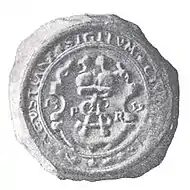
The town was first mentioned in 1496 and was granted city rights by the king Sigismund II Augustus in 1557, changing its name in his honor. It was redesigned and laid out in a very regular manner, with a spacious market-place.[4]
Until 1569 Augustów belonged to the Grand Duchy of Lithuania, and after the Union of Lublin it became part of the Crown of the Kingdom of Poland, while its cemetery was left in the Grand Duchy of Lithuania, both parts forming the Polish–Lithuanian Commonwealth. Augustów was a royal city of Poland, located in the Podlaskie Voivodeship. Tatar invaders destroyed Augustów in 1656, and the second half of the 17th century saw the town afflicted by plague.
In 1795 Prussia annexed Augustów in the Third Partition of Poland. In 1807, it became part of the Duchy of Warsaw, followed by incorporation into the Kingdom of Poland in 1815. It was made a county seat in 1842. Following Russia's full annexation of the Polish kingdom in the 1860s, it was administered from Suwałki.[3] With a population around 9400 (c. 1875), it carried a large trade in cattle and horses, and manufactured linen and huckaback.[3] Its canal connects the Vistula and Neman rivers and the railway reached the town in 1899, when its population was around 12,800.[4]
.jpg.webp)
During World War I, the Russian army successfully counterattacked the German army in the Battle of Augustów, in the lead-up to the better-known Battle of the Vistula River. In the aftermath of World War I, it was a site of fighting during the Battle of Augustów in 1920. From 1939 to 1941, Soviet troops occupied the town. Many inhabitants were sent to exile in Kazakhstan, from where some were able to return after 6 years. On June 22, 1941, just before the Germans captured the town, the Soviets murdered around 30-34 Polish prisoners in Augustów as part of the NKVD prisoner massacres.[5] The Nazi German forces occupied Augustów until 1944. World War II brought the destruction of about 70% of the town and death or departure of most of its residents, amongst them a community of several thousand Jews who were imprisoned in the ghetto situated between the canal and the river. The Germans executed practically all of them before they left. In 1945 the Soviets conducted the nearby Augustów roundup - a special operation against former Armia Krajowa anticommunist fighters.
Augustów ring road controversy
The construction of the Augustów bypass called Via Baltica, through the wetlands of the Rospuda Valley, attracted great controversy in 2007. The work was halted after the European Commission applied for an immediate injunction. See Rospuda River, European route E67.[6]
Tourism
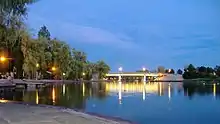
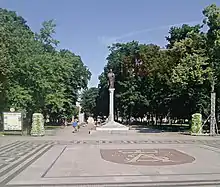

The town, although small, has many attractions for the visitors. The Oficerski Yacht Club Hotel, built in the 1930s, is an army yacht club that has been restored and converted into a resort.[7] It is located on the edge of one of many lakes in the region. Pope John Paul II has a memorial chair from the first and last time he visited the town right outside the club. Boat tours are also popular and the old town square still has its original cobblestone streets.
Every year hundreds of bikers come to Augustowskie Motonoce bikers festival.[8][9] Official event Facebook page: Augustowskie Motonoce.[10] Bands that over years participated in celebration include Bright Ophidia, AGE, ZZ Top Czech Revival Band, AC/DC Show Ukraina, Kraków Street Band, etc.
Demographics
|
2002 – 29,705 inhabitants, by nationality:[11]
|
1921 – 8,762 inhabitants, by nationality:[12]
|
1897 – 12,743 inhabitants, by language:[13]
|
Twin towns – sister cities
 Druskininkai, Lithuania (2007)
Druskininkai, Lithuania (2007)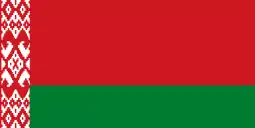 Grodno, Belarus (2008)
Grodno, Belarus (2008) Porto Ceresio, Italy (2003)
Porto Ceresio, Italy (2003) Rudky, Ukraine (2011)
Rudky, Ukraine (2011) Slonim, Belarus (2013)
Slonim, Belarus (2013) Supraśl, Poland (2012)
Supraśl, Poland (2012) Tuusula, Finland (1996)
Tuusula, Finland (1996)
Notable residents
- Edyta Dzieniszewska (born 1986), sprint canoer
- Joanna Fiodorow (born 1989), hammer thrower
- Jan Jaworowski (1923–2013), mathematician
- Zbigniew Kundzewicz (born 1950), hydrologist and climatologist
- Emil Leon Post (1897–1954), mathematician and logician
- Andrzej Sobolewski (born 1951), physicist
- Rose Pastor Stokes (1879 – 1933) American socialist activist, writer, birth control advocate, and feminist.
- Adam Wysocki (born 1974), sprint canoer
- Marek Zalewski (born 1963), archbishop
See also
| Wikimedia Commons has media related to Augustów. |
References
- "Population. Size and structure and vital statistics in Poland by territorial division in 2019. As of 30th June". stat.gov.pl. Statistics Poland. 2019-10-15. Retrieved 2020-02-14.
- "BIP: Urząd Miasta Augustów". Biuletyn Informacji Publicznej (in Polish). Archived from the original on 23 June 2016. Retrieved 23 June 2016.
- Baynes, T. S., ed. (1878). . Encyclopædia Britannica. 3 (9th ed.). New York: Charles Scribner's Sons. p. 79.
- "
 One or more of the preceding sentences incorporates text from a publication now in the public domain: Chisholm, Hugh, ed. (1911). "Augustowo". Encyclopædia Britannica. 2 (11th ed.). Cambridge University Press. p. 911.
One or more of the preceding sentences incorporates text from a publication now in the public domain: Chisholm, Hugh, ed. (1911). "Augustowo". Encyclopædia Britannica. 2 (11th ed.). Cambridge University Press. p. 911. - Krzysztof Popiński, Aleksandr Kokurin, Aleksandr Gurjanow, Drogi śmierci. Ewakuacja więzień sowieckich z Kresów Wschodnich II Rzeczypospolitej w czerwcu i lipcu 1941, Wydawnictwo „Karta”, Warszawa, 1995, p. 19, 42-44 (in Polish)
- European route E67, news.bbc.co.uk
- Oficerski Yacht Club R.P
- "Augustowskie MotoNoce 2018 Official video". Youtube.
- "X Augustowskie MotoNoce 2018". http://mototour.pl. External link in
|publisher=(help) - "Augustowskie Motonoce". au.motonoce.
- "(Polish Census of 2002) Deklaracje narodowościowe w gminach w 2002 roku". old.stat.gov.pl (in Polish). Archived from the original on 1 July 2014. Retrieved 29 February 2020.
- "Powiat Augustów". (Polish Census of 1921, Białystok Voivodeship) Skorowidz miejscowości Rzeczypospolitej Polskiej opracowany na podstawie wyników Pierwszego Powszechnego Spisu Ludności z dn. 30 września 1921 r. i innych źródeł urzędowych, Vol. 5, Województwo Białostockie (PDF) (in Polish). GUS. 1924. p. 1.
- "Russian Empire Census of 1897". demoscope.ru (in Russian). Retrieved 29 February 2020.
- "Miasta partnerskie". urzad.augustow.pl (in Polish). Augustów. Retrieved 2020-02-28.
